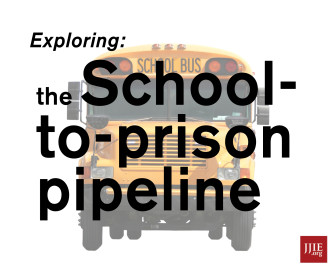
“Not every kid who does something needs to go to juvenile court. That’s what we try to get across to our administrators,” said John Hall, from the Memphis, Tenn. school system. Photo by Maggie Lee
Arresting young people too often turns them in to adults who get arrested, creating a so-called school-to-prison pipeline, say some juvenile justice experts. One way to break that cycle is to intervene early, but it takes a lot of community partners.
“Not every kid who does something needs to go to juvenile court. That’s what we try to get across to our administrators,” said John Hall, from the Memphis, Tenn. school system’s School House Adjustment Program Enterprise at an Atlanta conference on Thursday.
The school-to-prison pipeline is a name for a collection of practices and rules that channel minors out of school rooms into the juvenile justice system, followed eventually by adult prison.
 Those practices vary, and can include arrests for minor misbehavior in school, long school suspensions or poor or non-existent counsel in juvenile courts.
Those practices vary, and can include arrests for minor misbehavior in school, long school suspensions or poor or non-existent counsel in juvenile courts.
Hartford, Conn. Police Chief James Rovella has studied up on the tendency of youth offenders to become adult offenders.
“Those juveniles, who become adult offenders, are my customers, my clients, my job security, for not only police officers, they are also job security for (adult) corrections,” said Rovella. “I want to break that cycle.”
Both Rovella and Hill say keeping kids out of the pipeline requires cooperation among an area’s schools, police, courts and community groups.
Hill’s SHAPE program operates at the 21 of Memphis’ 200 schools that refer the most students to juvenile court. For eligible students, SHAPE replaces a police record with a 90-day program of mentoring, tutoring, counseling, community service, victim restitution and other services for infractions like disorderly conduct, simple assault without injuries and gambling.
Memphis’ SHAPE schools sent nearly 1,000 students to juvenile court in the 2007-2008 school year, the program’s first. Four years into the program, the tally was down to 264.
“Community safety has not been compromised and the system changes are becoming institutionalized, and there’s been improved cooperation and communication among participating agencies,” said Hill. For example, courts are issuing youth more summonses instead of transporting them, he said.
His community partners include public defenders, law enforcement, the district attorney’s office and juvenile court.
“Every year I spend about a week at the police academy talking about SHAPE,” said Hill. That’s part of roping in partners. SHAPE also trains school staff, principals and teachers.
Hartford formalized its attention to the pipeline in October 2012 with its own memorandum of understanding between city police and city public schools. Among other things, it says disruptive students should be handled with reasonable, consistent and fair consequences.
Now, for example, Hartford police are taught to tap emergency mobile psychiatric services and diversion opportunities rather than arrests.
But if the school-to-prison pipeline is a collection of practices, so is the valve to close the pipe.
Those practices need to be on paper, in the institutions, Rovella and Hill counseled. Otherwise, the departure of a single zealous reformer might throw the pipeline back open.
Hill said his job actually got easier when the federal Department of Justice came to his town and accused the Juvenile Court of Memphis and Shelby County of denying youth due process.
Memphis is now paying closer attention. In December 2012, it signed a memorandum of understanding with the DOJ laying out reforms.
Yet others fight similar DOJ allegations. In October, 2012, the federal office filed a lawsuit against Meridian, Miss., Lauderdale County and their juvenile court and judges, though not the city schools, on allegations of systematically incarcerating children for minor infractions and for denying them procedural safeguards.
Meridian and Lauderdale say the charges are unsubstantiated.
The case is still in court.
